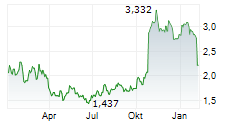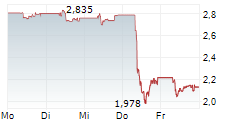- Q2 revenue was SEK 93.5 bn (SEK 101.5 bn in Q2 2024)
- Q2 EBIT included items affecting comparability of SEK 12.9 bn, consisting of an impairment of SEK 11.4 bn and restructuring charge of SEK 1.4 bn
- Q2 EBIT was SEK -10.0 bn (SEK 8.0 bn in Q2 2024)
- Q2 EBIT excluding items affecting comparability was SEK 2.9 bn
- Q2 EBIT margin was -10.6 per cent (7.9 per cent in Q2 2024)
- Q2 EBIT margin excluding items affecting comparability was 3.1 per cent
- Q2 basic earnings per share was SEK -2.53 (SEK 1.79 in Q2 2024)
- Q2 electrified car sales share at 44 per cent (48 per cent in Q2 2024), of which fully electric share at 21 per cent (26 per cent in Q2 2024)
Volvo Cars today reports a group operating profit (EBIT) of SEK -10.0 billion for the second quarter of 2025. The result reflects a continued challenging environment for the automotive industry, but the SEK 18 billion cost and cash turnaround plan is fully on track and the company is confident about more positive effects from the programme.
The result is impacted by the previously announced one-off non-cash impairment charge of SEK 11.4 billion, as Volvo Cars is adjusting the financial assumptions for the EX90 and ES90 platform because of market circumstances, the impact of import tariffs on ES90 and EX90 profitability and previous delays for the EX90. Additionally, the result is impacted by the one-time restructuring cost of SEK 1.4 billion, linked to the previously announced reduction of 3,000 headcounts. Excluding the items affecting comparability, Volvo Cars reported an operating profit of SEK 2.9 billion and an operating profit margin of 3.1 per cent.
In terms of retail sales, the company sold 181,600 cars in the second quarter, a drop of 12 per cent compared to the same period in 2024. For the first six months, sales are down 9 per cent compared to the first half of 2024. Revenues came in at SEK 93.5 billion and the group EBIT of SEK -10.0 billion translated into an operating profit margin of -10.6 per cent. More details about its second-quarter performance can be found in Volvo Cars' full financial report.
"The market continued to be challenging in Q2 as well," said Håkan Samuelsson, President and CEO of Volvo Cars. "Demand remains under pressure from the macroeconomic environment, tariff-related uncertainties and tougher competition. However, our turnaround actions are starting to show results. In a Q2 market with headwinds we made a clear improvement of free cash flow versus Q1 and our EBIT margin excluding items affecting comparability was slightly higher."
Good progress on profitability, electrification and regionalisation
Earlier this year the company launched a SEK 18 billion cost and cash turnaround plan. This is starting to have an impact with the full effects coming in 2026. The plan supports the company's strategic direction which rests on three pillars: profitability, electrification and regionalisation.
Looking at profitability first, the turnaround plan is on track. The reduction of 3,000 positions globally is going into execution, and approximately 1,100 people have already left Volvo Cars. Together with spending cuts this will lower its indirect cost base and establish a leaner and more efficient organisation.
In terms of direct cost reductions, the company has started to execute on several actions to reduce material costs. One element is to utilise more synergies within the Geely group by collaborating on procurement. Another synergy area is to develop new car models together especially for the China market. Volvo Cars has also effectively implemented cash actions including a reduction of working capital and a reduced investment pace.
The company's investment volume will ease off as planned as Volvo Cars has made almost all major investments related to its new product architecture. This will deliver significant future cost reductions and performance improvements thanks to mega-casting, cell-to-body battery technology and more efficient, in-house developed e-motors.
The first car on this new architecture is the all-new, born-electric Volvo EX60, a car for the company's important best-selling segment. It will deliver improved performance and lower product costs necessary for Volvo Cars' continued transformation towards full electrification.
Most analysts expect demand for fully electric cars to continue growing and to outgrow traditional combustion engine cars by 2030. Consequently, most of the company's development efforts remain firmly focused on electrification.
Meanwhile, Volvo Cars will also refresh its plug-in hybrid (PHEV) cars to offer an attractive bridge solution for customers and areas where charging infrastructure still is weak. The company will soon launch its first extended-range PHEV, the all-new XC70, and start production during the third quarter. It is an answer to a growing demand for such powertrains and it will first be offered in China where Volvo Cars sees big opportunities for this car.
The XC70 is a good example of regionalisation, the third pillar. With globalisation in retreat, Volvo Cars is adapting to a more regionalised world. The company is empowering its three key regions to be more adaptive to regional requirements and customer preferences to be able to accelerate profitable growth.
Volvo Cars is implementing a new governance model for its China operations, with a clear regional performance, operational and decision-making responsibility. In the Americas, a dedicated governance model will also be introduced.
To increase the utilisation of its Charleston plant and to reduce the effects of import tariffs, Volvo Cars will introduce local assembly of the best-selling XC60 SUV in the US. In Europe, the company recently announced plans to build the new Polestar 7 in the new Kosice plant under construction in Slovakia. It will be the second car to be built in Kosice, following a yet-to-be-announced next-generation Volvo model.
Looking ahead
While 2025 will remain challenging, the company's SEK 18 billion turnaround plan is fully on track. Volvo Cars has seen a positive effect already in the second quarter and is confident about further positive effects from the programme.
Commercially the company will keep a sharp focus on driving sales, including ramping up sales of the EX30 and the born-electric cars in the 90 Series. The EX30 is now made in the Ghent factory which reduces the impact of tariffs and the EX90 is ready to meet the requirements of demanding premium customers after significant upgrades of its software.
The ES90 all-electric sedan is ready for the market this autumn and the XC70 will take Volvo Cars into a new growing segment for long-range PHEV cars. Development of the EX60 is fully on track and will strengthen the company's all-electric lineup next year as it enters the largest and most popular fully electric segment. This will strengthen its position and underpin its growth potential in the EV market.
When market sentiment picks up, Volvo Cars expects to be well positioned for profitable growth, with a future-proof product line-up as well as a leaner and more efficient organisation.
Note to editors
Håkan Samuelsson and chief financial officer Fredrik Hansson will host a livestream on Volvo Cars' Q2 2025 results for media, investors and analysts at 08:00 CET today. The presentation will be held in English and followed by a Q&A session.
Link for livestream
It will be possible to ask questions during the Q&A session following the main presentation. To participate, you can either use the chat function online to type your question or you can call in. To call in, participants need to register via the link below and will then receive the dial-in details and individual PIN.
Link to register
This disclosure contains information that Volvo Car AB (publ) is obliged to make public pursuant to the EU Market Abuse Regulation (EU nr 596/2014) and the Swedish Securities Markets Act (2007:528). The information was submitted for publication, through the agency of the contact person, on 17-07-2025 07:00 CET.
For further information please contact:
Volvo Cars Media Relations
+46 31-59 65 25
media@volvocars.com
Volvo Cars Investor Relations
+46 31-793 94 00
investors@volvocars.com
-------------------------------
Volvo Cars in 2024
For the full year 2024, Volvo Car Group recorded a record-breaking core operating profit of SEK 27 billion. Revenue in 2024 amounted to an all-time high of SEK 400.2 billion, while global sales reached a record 763,389 cars.
About Volvo Car Group
Volvo Cars was founded in 1927. Today, it is one of the most well-known and respected car brands in the world with sales to customers in more than 100 countries. Volvo Cars is listed on the Nasdaq Stockholm exchange, where it is traded under the ticker "VOLCAR B".
"For life. To give people the freedom to move in a personal, sustainable and safe way." This purpose is reflected in Volvo Cars' ambition to become a fully electric car maker and in its commitment to an ongoing reduction of its carbon footprint, with the ambition to achieve net-zero greenhouse gas emissions by 2040.
As of December 2024, Volvo Cars employed approximately 42,600 full-time employees. Volvo Cars' head office, product development, marketing and administration functions are mainly located in Gothenburg, Sweden. Volvo Cars' production plants are located in Gothenburg, Ghent (Belgium), South Carolina (US), Chengdu, Daqing and Taizhou (China). The company also has R&D and design centres in Gothenburg and Shanghai (China).


